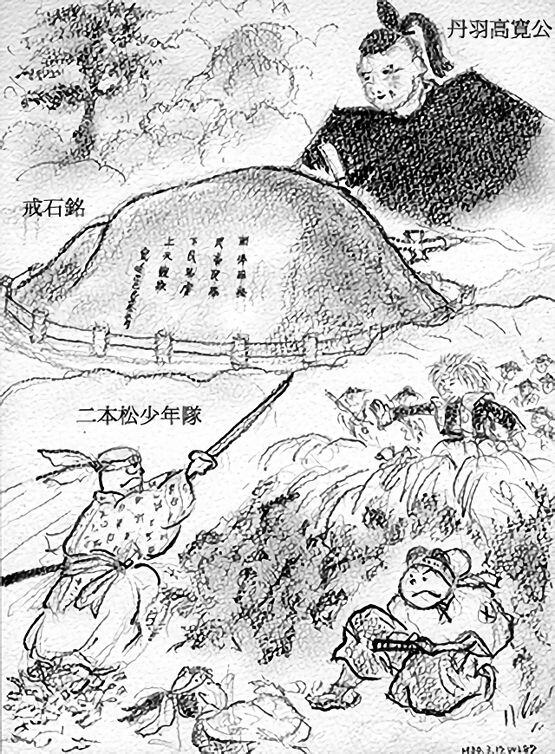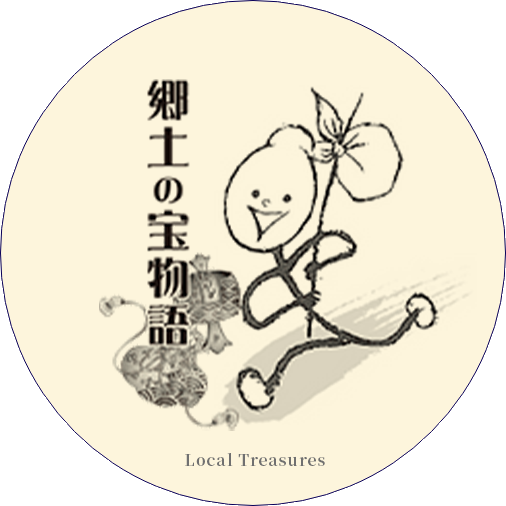| Yeast |
“Kimoto, can you tell me more about the Nihonmatsu domain today?” |
| Kimoto |
“Alright. The Niwa family had again been restored to daimyo rank thanks to Ieyasu Tokugawa. Although they were officially ‘outside’ daimyo, they were very loyal to the Tokugawa shoguns, and were accordingly trusted. The following story has come down to us. When the other ‘outside’ daimyos from Tohoku would pass through Nihonmatsu on their way to Edo for the biannual attendance on the shogun, the Niwa lord would wait until they had peacefully passed through and then would himself travel to Edo and make his report. At the time of the return from Edo, the Niwa lord would be the first to go back home to watch whether the other daimyos would pass Nihonmatsu without causing any problems, and then would again send a report to Edo.” |
| Yeast |
“So he fulfilled an important task!” |
| Kimoto |
“Yes. There is another story about the tense relations between Nihonmatsu and the Date domain which in the past had been at war with each other. I don’t know whether it is true or not, but when the Date clan had to travel through Nihonmatsu, they would light the fuses of their matchlocks, and pass through with their guns ready for use.” |
| Yeast |
“Whew! It’s terrible to stir up trouble with the large Date domain! You can’t sleep peacefully anymore!” |
| Kimoto |
“That’s why the Nihonmatsu domain built mausoleums for father and son Hidetada and Iemitsu Tokugawa in the castle town. When the Date domain and other domains went past these mausoleums, they had to alight from their litter, put down their swords and make obeisance. So the relation of trust, which made it possible to receive the mortuary tablets from the shogun family, had born fruit.” |
| Yeast |
“Why was that at all possible?” |
| Kimoto |
“80% of all daimyo had a rank lower than 50,000 koku. With 100,700 koku the Niwa family was in an important class. Moreover, the status of the daimyos was also decided by the prestige of their ancestors. So the Niwa family had a quite high status thanks to the fact that their ancestor Nagahide had possessed 1,230,000 koku.” |
| Yeast |
“Such ancestors truly deserve gratitude!” |
|
 |
| Kimoto |
“But the Niwa family in fact had to conduct themselves on a level above their income, and out of loyalty to the shogunate they volunteered to undertake many burdens of public service. That’s why the financial situation of the Nihonmatsu domain became increasingly worse.” |
| Yeast |
“That’s a pity. What did they do about it?” |
| Kimoto |
“The fifth Niwa lord Takahiro asked the Confucian scholar Sakuhi Iwaida to reform the domain finances.” |
| Yeast |
“That must have been the scholar you introduced earlier, who set up the Kaisekimei Stone to caution the retainers. Was he successful?” |
| Kimoto |
“Things were not so easy. The reforms had to be repeated several times. The 9th lord Nagatomi set up a domain school ‘Keigakukan’ and put much effort in education.” |
| Yeast |
“That must have been around the time that the 4th Generation received a quince tree from the Niwa lord.” |
| Kimoto |
“You have a good memory! Nihonmatsu had a prefect in charge of sake and promoted sake brewing. At the end of the Edo period, the 10th Niwa lord Nagakuni joined the ‘Ouetsu Reppan Alliance’ and fought against the army of the new Meiji government. However, on July 29, 1868, Nihonmatsu Castle fell. At that time the tragedy of the Nihonmatsu Youth Brigade occurred.” |
| Yeast |
“Hurrah for the Youth Brigade!” |
| Kimoto |
“One 16-year old member of the Youth Brigade received three ‘Tenpo-sen’ coins from his mother and carried them on him. When the Youth Brigade came under heavy fire from the enemy which was hiding at the entrance to the castle, the Tenpo-sen coins were shattered, except the last one which stopped a bullet and saved the boy’s life.” |
| Yeast |
“Great! (Sniffs) Motherly love caused a miracle.” |
| Kimoto |
“Yes. After the war, the Nihonmatsu domain was for a short time ‘Nihonmatsu prefecture.’” |
| Yeast |
“What a lot of stories there are. At the time of the Bean Throwing festival (Setsubun), people in Nihonmatsu don’t call out the usual ‘Oni wa soto’ (Devils Outside!), as that contains the sound ‘niwa,’ but they call ‘Oni soto.’ Local history is still alive today!” |





